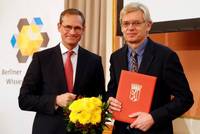Research prize for UniCat Professor Peter Hegeman, founder of optogenetics
UniCat Professor Peter Hegemann today received the Berlin Research Award from the Governing Mayor of Berlin, Michael Müller. Sandra Scheeres, Berlin Senator for Education, Youth and Science, congratulates Prof. Hegemann and his team for this outstanding award.
Peter Hegemann has been a member of the Berlin-Brandenburg Cluster of Excellence UniCat since its foundation. His research is part of UniCat Research Field E4. He is also head of the Working Group on Experimental Biophysics at the Institute of Biology at Humboldt-Universität in Berlin.
As founder of optogenetics, Peter Hegemann has fundamentally advanced life and neurosciences. The technology facilitates detailed insight into the functions of specific cells and tissue using light. In this context, the identification of channel rhodopsins as light-dependent ion channels was essential. These proteins can be transplanted into living tissue. Subsequently, light can be used to switch nerve cells on and off and to thus study the functions of cells, cell types, and tissue. This new technique of optical visualization of the circuits of neural pathways is applied worldwide, for example in research on neurological diseases such as epilepsy and Parkinson's.
Peter Hegemann has been honored several times in the past for his achievements, such as in 2013 when he received the Gottfried Wilhelm Leibniz Prize of the German Research Association (DFG - Deutsche Forschungsgemeinschaft) and the Brain Prize of the Grete Lundbeck European Brain Research Foundation. Prof. Hegemann has been a Professor at Humboldt-Universität in Berlin since 2005. "His research focus is strengthening an important area in Berlin's future, providing the state with worldwide visibility as outstanding research location," says Michael Müller.
"The granting of this award to our research group clearly honors the importance of basic research. This especially has made me happy. I certainly hope that this decision by the selection committee will bring confidence to many other science policy makers in Berlin to support research projects that may seem bizarre or strange to them in many ways, such as light-controlled vectorial catalysis," explains Hegemann.
The President of Humboldt-Universität in Berlin, Prof. Jan-Hendrik Olbertz has congratulated the awardee warmly and is pleased with the recognition. The award shows that Humboldt-Universität and its Cluster of Excellence UniCat offer excellent conditions for the collaboration between biologists, chemists, and potential end-users.
The prize, which has been awarded for the eighth time, is the most significant recognition granted by the science and business location Berlin. The prize money totaling 40,000 Euros is awarded to the institution in which the awardee has completed his or her merited research. This year's main prize goes to Prof. Peter Hegemann at HU Berlin, and the 10,000 Euro junior researcher prize has been awarded to Political Scientist Dr. Tine Hanrieder of the Berlin Social Science Center (WZB).
Contact:
Ibou Diop
Humboldt-Universität zu Berlin
Phone: 030 2093-2945
ibou.diop.1(at)hu-berlin.de
Dr. Martin Penno
Cluster of Excellence UniCat, Public Relations
Phone: 030/314-28 592
martin.penno(at)tu-berlin.de


